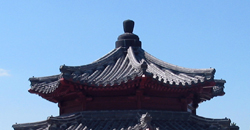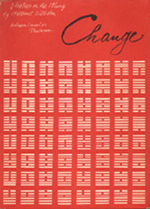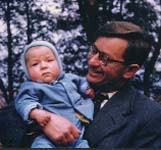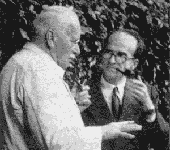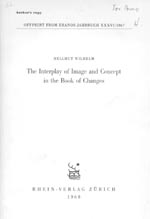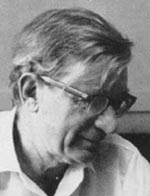Sinological Profiles
Hellmut Wilhelm
10 Dec 1905 (Tsingtao) - 5 July 1990 (Seattle)For those of us who knew him as a teacher at Seattle, the fact that Hellmut was Richard Wilhelm's son emerged only gradually. He was for us a personality in his own right. Fritz Mote has caught the quality of that personality perfectly, from a chance encounter in Peking in 1945:
I was in uniform, and driving an American Army jeep, hunting for an address somewhere in the eastern side of the inner city. I stopped at an ordinary looking front gate of a typical Peking house and knocked, expecting that a Chinese servant would appear, of whom I could ask directions. To my surprise, the gate was opened by a Caucasian gentleman, who courteously but silently beckoned me to step inside. I managed to get a quick look across the courtyard, and at the plain but quite neat and elegant appearance of the living quarters beyond, from which other voices could be heard. He looked to be perhaps ten or twelve years my senior, but he wore a friendly smile as he said hello. He was wearing a white shirt open at the collar, and held a cigarette in his hand.
His "hello" encouraged me to try English, and I asked my question. He laughed and replied, "That hutung is really hidden away, but I can tell you how to get there." He did, and after an attempt at further conversation - "This is an interesting part of the city." "Ah, ja, but Peking is a great city" - I thanked him and left. Somehow that brief encounter fixed itself in my imagination. Here was a most sympathetic sort of man, one I would have liked to visit with, but I did not quite have the courage to stay longer. I guessed from the faint trace of accent that he was German. My sense of Peking in the fall of 1945, a month after the end of the war, was that it was full of expatriate Europeans of all kinds, and I wondered into which category this one fell. I hoped he was a professor or a writer, and not one of the Nazis that my branch of the armed services was supposed to be rounding up for interrogation.
Courteous, inviting, able to point out where the treasures of China lay hidden from the visitor, but also with his silences, and always with a cigarette in his hand: that was Hellmut.
He was born in Shandung, in the German concession of Tsingtao, still the home of the best beer in China, and then a center of German missionary activity. His father, Richard Wilhelm, had come as a missionary in 1899, but was won over instead by Chinese culture, and became a missionary in reverse, the Arthur Waley of Germany (Arthur Waley later returned the compliment by translating the poems in the English version of Wilhelm's popular book The Soul of China). He worked, however, chiefly in the classical zone where Legge loomed large for the English-reading world. He translated into German many classical works, not only the Analects and Mencius, but the Kungdz Jya-yw and the Li Ji; not only the Dau/Dv Jing but the Lyedz, with the Lw-shr Chun/Chyou representing the more worldly philosophers. But for him, the centerpiece of it all was the Yi Jing, the fatally attractive Book of Changes.
With the Japanese occupation of Tsingtao, Hellmut was sent to stay with friends in Shanghai. At the end of WW1, the Wilhelm family returned to Germany, where Richard was appointed the first Professor of Sinology at the University of Frankfurt (somewhat mirroring the career of Legge, who finished his life as the first professor of Chinese at Oxford). In 1925 he founded the journal Sinica. Hellmut did his schooling at Stuttgart and Frankfurt, in the latter place also assisting his father at the China Institute. He later studied law and political science at Kiel and Grenoble, returning at the end to Frankfurt. In 1928 he qualified in law, and began work as an intern in the Frankfurt courts, still continuing to assist his father with the Seminar and with Sinica. His father's death in 1929 seems to have produced a break in a career choice that had already begun to be unsatisfying, and he set out for Berlin to make a second life in Sinology. He passed the Interpreter's exam in 1930, and earned his PhD in 1932 with a thesis under Otto Franke on the perhaps prescient subject of Gu Yenwu as an Ethicist.
One step ahead of the rising Nazi tide, Wilhelm left for Peking, at first as a correspondent for the Frankfurter Allgemeine Zeitung, and then as founder and Director of the Deutschland-Institut in Peking, through which he arranged activities fostering cultural exchange between China and Germany. The Institute's success attracted German government support, but this in turn threatened the imposition of German government policy, which since 1933 had prohibited Jews in academic positions. Hellmut resigned the Directorship lest his Jewish wife Maria compromise the Institute's chances for continued funding from the homeland. It was not an idle worry. Elsewhere in the hemisphere, the Deutsche Wacht, a magazine for the German community in the Dutch East Indies in which von Zach had sometimes published, was shut down in 1933. Instead, Hellmut served as editor of the new and otherwise funded journal Monumenta Serica, based at the Catholic University of Peking (Fu-jen University), and contributed an article (on an appropriately legal topic: "Der Prozess der A Yün") to its first issue in 1936. In collaboration with several Chinese scholars, he had begun work in 1935 on a Chinese-German Dictionary. Beginning as a Lecturer, he became after some years a Professor of German at Peking University. In all these ways, he presided over a two-way cultural contact between China and Europe, deeply studying both, rejecting neither, and sensitive to the general human factor behind all. In 1936 he contributed a preface to the reissue of his father's Lyedz translation, and in 1940, he published an article on Confucius and the Chun/Chyou in the Yenching Journal of Social Studies.
A contemporary impression of his scholarly standing at this time exists, from the hand of Wolfgang Franke, son of Otto, who was also working in Peking. In an article on The Younger Generation of German Sinologists, published in Monumenta Serica v6 (1941), Hellmut occupies these lines:
Hellmut Wilhelm (Peking) has published studies on jurisprudence and the spiritual and social history of China, shorter translations from modern Chinese literature. He has been, however, primarily concerned with the study of Ku T'ing-lin (1613-1682).
That is, Gu Yen-wu. There followed a footnote listing 11 publications, from his thesis of 1932 to the Confucius article of 1940. There is as yet no hint of the Book of Changes. It was soon to make its appearance
As WW2 advanced, the Tsingtao situation of his childhood repeated itself in the Japanese occupation of Peking. It was at this juncture that Hellmut came fully into his intellectual patrimony. Some German residents of Peking were in one way or another at odds with the German government. Though they were technically at liberty, they were in a difficult position. As Hellmut describes it in the preface to his book Change: Eight Lectures on the I Ching:
This little volume consists of lectures given in Peking in the winter of 1945. This was the grim time when the war in China had been going on for almost six years and Peking was under Japanese occupation, a time when all creative forces seemed frozen and darkness ruled the day. During that period there was a group of German-speaking people in the city who kept apart from the activities of the German community and everything connected with it. This group found a center in the home of Wilhelm Haas. Wilhelm Haas is a man with the courage of perseverance; even in the most hopeless situations he has never yielded to despair. And thus it was not by chance that one day he suggested to me that I give some lectures at his house on the Book of Changes.
The two-way style of those "lectures" can be grasped from their opening words:
Our object is to spend some hours together discussing the Book of Changes.
There was nothing in this of the podium manner, no Herr Professor Doktor. The learned speaker and his completely uninformed if interested auditors were in the thing together. This was to become his paradigm as a scholar and as a teacher.
There were three of these lecture series: one resulting in a book on China's History in 1942, a second on State and Society in China in 1944, and the third, also in 1944, on the Yi, his father's home territory, and, as he says in the Preface, "based wholly on the work of my father," but in their awareness of the relevant scholarship, and in their sensitivity to the possibilities within the text itself, taken well beyond the point his father had reached. Shortly after the end of hostilities in 1945, the Chinese-German Dictionary was published by Nössler, a German firm in Shanghai. Its 1,236 pages are among other things remarkable for coverage of the nomina technica of music. At about that time came came the meeting described above, between the finished scholar who was to become one of the most influential of American Sinologists, and the young man who was to be his most notable student. Neither of whom knew that, or even learned each other's names, at the time.
With the approach of the Communist forces in 1948, Hellmut accepted the offer of George Taylor to join what Taylor hoped would be the West Coast answer to John King Fairbank: The Far Eastern and Russian Institute, and its academic counterpart, the Far Eastern and Slavic Languages and Literature Department, at the University of Washington. Hellmut's marriage had broken up in the years after the war, and he came alone to Seattle. In 1951 he marryied the musician Erica Samuel, and began a second family. Erica had her own personal twinkle, and their house, high on one of Seattle's hills overlooking the Ship Canal, was a magnificent setting for either work or reflection. I happened to be there late one evening, and looking out over the lights of the city, I said, "You must get magnificent sunsets up here." "No," he replied, "sun-ups." It was so like him to find a perch with a window on the process of becoming. It was impossible to define a boundary that he had not ventured beyond, and ventured with sympathy. With my recent degree in composition, I was sour on modern music, and expected to find him in agreement. "But we must also know the music of our own time," he answered, and forthwith played me a recording of one of Webern's Bach transcriptions. The piece was every bit as pointillistic as the lights below, it was the perfect counterpart. (I hope, and believe, that I refrained from observing that the example proved my point; that modern composers were lost without a classical composer to attach themselves to).
It was also in 1951 that Hellmut began to attend the Eranos meetings in Switzerland, the largely Jungian confab in whose volumes, for the next twenty years, many of his own Yi investigations first appeared. These meetings, attended across the Atlantic at a time when scholarly travel was rarer than it later became, were for him not only a renewed contact with Europe, but an affirmation of wider human horizons than either Europe or Asia by themselves invited. Seattle Students learned where to find the Eranos volumes on the library shelf. Some of the stuff in them was frankly weird. Hellmut's voice, first in German and later in English, was always lucid, patient, sensitive, moving forward on the point in question. The point in question, to be sure, was sometimes itself mystical. In both his teaching and his advising, Hellmut allowed his students much latitude for unbelief in the Yi, or for sidestepping the whole Yi matter, but he himself gave deep assent to the Jungian approach, and saw significance in the Leibnitzian equations and post-Leibnitzian elaborations that have been applied to the Yi in modern times. That Confucius had revered the text, despite considerable evidence to the contrary, he never doubted. That it properly held first place among the classical texts, Sywndz notwithstanding, he was firmly convinced.
These and like convictions somewhat deafened him to the critical scholarship of his own time. For a while in the late Fifties, a few students gathered with Hellmut in my room, every week, to memorize the Dau/Dv Jing, at the kindly rate of one chapter per week, to throw darts at a picture of whoever was then the ranking doubter of Laudz's authorship of that text, and to feel cutting-edge generally. It being my room, refreshments were naturally my responsibility. I was living on $80 a month, including books, rent, and tuition. One afternoon I produced a mushroom soup (I now see it should have been called mushroom tea) made by boiling shiitake in water on my hotplate, removing the shiitake for later use, and consuming the liquid as a meal. Hellmut was enchanted with it. He knew a lot about privation in scholarship, and he knew a lot about kindness to the young. In his Yi studies too, however metaphysical they may have been for him inwardly, there was on the outside always a human face; a voice speaking to the human condition in all its varieties and vicissitudes.
He liked what he called "rogue elephants," and was himself forever learning, not pontificating about what he had previously learned. In his Seattle years, while pursuing his historical studies and training several consequential Chinese historians, he turned increasingly to literature. Incredible as it will now seem, in that large program he himself taught the introductory courses in both subjects, alternating year by year. George Taylor once asked him, when it looked as though a decision would have to be made, which field he would keep for his own. Taylor took it for granted that the answer would be "History." But Hellmut answered, "Literature." In that field his grounding was less deep, and it was possible to catch him. On hearing him refer in class one day to the lost palindrome poem of the Six Dynasties poetess Su Hwei, I went home, looked it up in Ding Fu-bau, analyzed its form (delightfully elaborate, with many centers, like a quilt), translated the core areas of it, and turned it in as a term paper. He was not offended; rather, amused. (He got even in a subsequent semester, by assigning me as a paper topic Wang Shr-jvn's Eight Poems on the Autumn Willow, opaque little nuggets which required more erudition per inch, and Six Dynasties erudition at that, than I could come up with in a furlong).
His own production throughout his life was in small units, some of them gathered into books (like the Peking lecture series, or the later volume of collected Eranos lectures), and the rest remaining as articles. My pleasure on later seeing the Eranos papers in book form was diminished by the fact that the book relegated my autographed offprints to the category of keepsakes rather than, as they had been, working papers.
His survey course in history was an enlarging experience, but his literature course was a revelation. Lectures for me are not something one transcribes, but in that course one found oneself making the effort. Every word was a judgement worth pondering; every name was something one might want to look into, preferably as soon as the bell rang. When the bell did ring, the doorway would be instantly jammed with students having exactly that thought, and trying to beat the others to the library. I have never seen anything remotely approaching it. Some years later, several former students got together to nominate Hellmut for the University's Distinguished Teaching award, filing testimonials the like of which can rarely have crossed the desk of any administrator. Hellmut didn't get the award (as Erica remarked to me recently, "Yeah, the letters were all from graduate students"). I am sure I am not the only one who in subsequent years has tried, and failed, to imagine the paragon of pedagogy who did get it.
Something of the same electric atmosphere, not produced in vacuo from the speaker, but from the interaction between the speaker and the hearers, obtained in the three modern history seminars in which Hellmut took part. His Russianist colleague Donald Treadgold put it this way:
He was an enthusiastic and solid contributor to all three, which together generated the liveliest, most fruitful, and most exciting intellectual atmosphere I have ever seen - an atmosphere whose equal I have not encountered on any of the 50 campuses on which I have lectured, or in the UW since that time.
The literature lectures, and the speaker, were constantly in motion. Hellmut paced back and forth, putting his thought together in front of you; he smoked, with an occasional wry remark about those who fancied that smoking was bad for the health; he fingered the bunch of keys in his pocket. He listed bewitching possibilities of acquaintance, authors and titles, in his spidery handwriting on the blackboard. I developed a sort of spidery shorthand of my own, to keep pace. He also punctuated the subject with asides which were miniature lessons in the scholarship of the subject. He would quote a remark of "old Franke," and we greenhorns would realize for the first time that there was such a person as "Franke," perhaps more than one of them (there were in fact three). Hellmut's cosmopolitan acquaintance soaked itself into our lesser horizon. The highly contentious nature of the world of Sinological scholarship he took in stride. Reading a few lines from something particularly acid by Hightower in HJAS, he would look at us with a twinkle verging on a laugh, and say confidentially, "The funny thing is, he really loves Chinese literature." It was a healing remark.
When the survey course came round again two years later, I sat in on it. One wanted to know what Hellmut had found out in the meantime. Unlike certain of his colleagues, who lectured year after year from the same worn set of 3x5 cards, Hellmut approached old material with new reflections, and added new material. A second set of notes eventuated. The third time, two years later yet, some fellow students in the class had similar ideas. Despairing of Hellmut's ever writing his own book on the subject, we got together to transcribe, combine, and type up our joint notes. This effort did not last very long (collaborative work is enormously time-consuming), but it did show us, close up, how Saussure's Cours de Linguistique Générale had come into being, half a century previously.
Seattle in those days was easily the most faction-ridden Sinological center in the world. The Chinese and the Japanese were still fighting WW2, the modernists were in tension with the classicists, the scholars in some fields (and their students) were not speaking to the old hands (and their students). Hellmut remained on speaking terms, even working terms, with everybody. He might differ, but he kept differences in perspective, and he kept his respect, not so much for persons, though there was that too, as for the possibilities that exist when persons bring their different insights to the same table. He was the soul of that process. Treadgold again, on the Seattle history seminars:
We discussed, we argued, we disagreed, on occasion we shouted, but the upshot was a string of remarkable books, articles, speeches, conferences, and courses - for the research findings of all this found their way into teaching, exactly as they are supposed to do and often, alas, do not.
He tolerated dissent; he encouraged dissent. He liked things to happen. When the Wen-lin venture was launched at Wisconsin in 1964, he agreed to contribute an article on the Shr Pin, and proposed me, then past my orals and working on my own in Kyôto, as a contributor to the same volume. I wound up doing a piece which took an opposite view of the Shr Pin. The two articles sit side by side in that volume to this day, not as antagonists, but more like two voices among others, raised in some particularly outspoken seminar. I am sure both of us felt we had the better of it (I would mention, on my side of the discussion, that my paper, not his, was later chosen for inclusion in a volume of Chinese translations of Western scholarship), but the chief victor in the conjunction was variety itself. A spirit of probing, a liveliness of thought. The air around Hellmut always tingled with liveliness of thought. His own, and because of his, yours.
Hellmut's reputation was high, globally, in those days. He had opportunities to go elsewhere. He was particularly tempted by one offer from somewhere in the German-speaking world. This we knew of, and we were resigning ourselves to losing him. But in the end, he felt too importantly about the informality he enjoyed in Seattle, the chance to work on a level with other people. The "Herr Professor Doktor" ethos repelled him. This I believe because he told it to me, not in his office, but on the way to the UW snack bar for a bit of lunch and conversation with students. His ability to draw students into his own search, and thence into the world of current scholarship, and the vast panorama of previous Chinese learning, was his sovereign quality. Another aspect of that largeness was later noted by Herbert Franke -
Hellmut was a Sinologue, that is, a scholar who refused to be isolated by the barriers between the so-called disciplines and who in his teaching and his publications viewed the civilization of China as a whole.
The undivided approach was in retreat before the Area Studies juggernaut from the moment Hellmut had come to Seattle; that Sinological tendency reached its apex in the US in 1964. Only a few years later, Hellmut's personal world began to diminish also. On my way back from Japan in 1966 I visited him in his office on the fourth floor of Thomson, and found him uncharacteristically gloomy. His eyes were not good. He had relinquished his chairmanship of the Department before his actual retirement, and his successor was making things difficult for several of his students who had been caught by the transition in the middle of their theses. "I gave up all power too soon," Hellmut told me ruefully.
A 65th birthday tribute in Monumenta Sinica was kept so secret from him that the paper "On Ming Orthodoxy," which he had coincidentally submitted for publication in that journal, was itself printed at the head of the Festschrift. It was irregular, but somehow fitting. There he was, one of the crowd, sharing his results along with everybody else; learning and contributing, even at his own party. His own seminar; the seminar of the whole. The energy we picked up from him was the same energy that drove his own continual quest for more, and more adequate, knowledge.
But apart from that congratulatory moment, his passage to private life in 1971 was not the pleasant one which we had hoped for him. Academe turns its back quickly on those who depart, and Hellmut felt abandoned, one might say outflanked, even before he departed. In his retirement to his aerie in the Seattle sunrise, though always courteous to occasional visitors, and generous in sponsoring, and helping find funding for, the posthumous English publication of Iulian Shchutskii's Researches on the I Ching (1979), he kept more and more to himself, working alone on the history of Chinese literature which in the end eluded him, as it had earlier eluded us. His health gradually failed. He died on 5 July 1990, a day of no particular consequence otherwise, leaving Erica, two sons established in conspicuously non-Sinological professions, and a heritage widely dispersed among those whose passion for the study of China was kindled at least in part from his own.
We may end with a last few lines from Fritz Mote's memorial, among those gathered in the 1992 volume of Oriens Extremus:
Every historical figure he discussed was seen as a human grappling with the dilemmas of understanding the human condition, and utilizing in deeply personal if not always commendable ways the tools his civilization provided him. As student and as friend, I felt that he looked upon us in the same way. His most natural role, but not a consciously didactic one, was to help us find our way, by reminding us of the broader and deeper dimensions of human capacities, and being able to show us where we are.
That is why I treasure the recollection of meeting him in Peking in 1945. I was overwhelmed by fascination with the place and the people, and I was lost. He knew where I wanted to go, and with quiet and un-selfconscious grace, he showed me the way. It was to be like that thereafter.
He is gone. May those who come hereafter be so fortunate as to find such a guide.
E Bruce Brooks
References
- Wolfgang Franke. The Younger Generation of German Sinologists. MS v5 (1940) 437-446. The bibliography in n21 of this article was immediately obsoleted by the next article in that issue, a contribution by Hellmut to a joint study of the "Grabtempel des Kang Ping"
- Frederick W Mote. Hellmut Wilhelm: A Biographical Note. MS v29 (1970-1971) iii-vi
- Frederick W Mote. Hellmut Wilhelm Remembered. OE v35 (1992) 15-18
- Donald W Treadgold. Hellmut Wilhelm: Scholar, Teacher, Colleague. OE v35 (1992) 12-14
- Herbert Franke. Remarks by a Colleague and Friend. OE v35 (1992) 22
- A List of Publications of Hellmut Wilhelm. OE v35 (1992) 23-34
- Martin Kern. The Emigration of German Sinologists. JAOS v118 #4 (1998) 507-529
- University of Washington page
Fritz Mote and Erica Wilhelm contributed to this profile.
15 Jan 2007 / Contact The Project / Exit to Sinology Page
